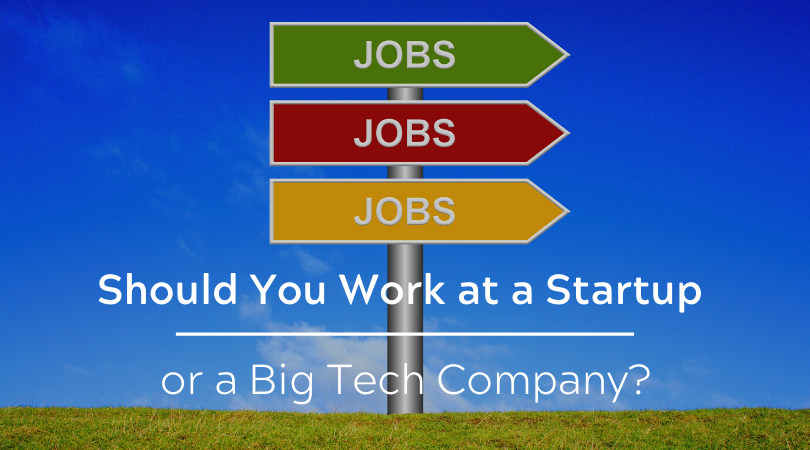
Would you turn down the opportunity to work for one of the BIG tech companies and choose a company no one’s ever heard of? I did!
But it wasn’t a simple decision. It’s important to weigh out the advantages and disadvantages of each and determine which model fits your career and personal goals.
Whenever I talk with people, I hear them mention the same companies over and over again. Everyone seems to want to work at either a hot new startup or one of the FAANG companies: Facebook, Apple, Amazon, Netflix, and Google. There are a lot of advantages to working at each, making it often hard to choose between the two options.
Plus, there is a middle ground option for you to consider as well.
The Pros of Working at a Startup
Coming from my own experience, I’ve found there are three important points in the startups’ favor.
More Ownership Over Your Projects
When you work at a big tech company, there are a ton of projects going on. And the teams are so big that as a new college grad and the newest employee, you don’t have much ownership over the products. You’re working on much smaller tasks in the grand scheme of things because that’s what the company needs.
Working for Yext, I quickly took on whole projects by myself, even though I was so new to the company. And through that process, I gained experience much faster than if I had been a smaller cog in a big wheel.
More Opportunities To Work With Different Tech
Similar to the first point, working at a startup can provide a lot more opportunities to use different tech. Because there are not as many people in a startup, you’re going to be a lot more full-stack; you’re going to have to handle a lot more stuff yourself. This could be a pro or a con, depending on what you’re looking for.
The really great part is that if you are fresh out of college and trying to figure out what you’re interested in, a startup is going to have a lot more wiggle room for you to learn a great variety of tools and technologies.
You’ll get the chance to figure out what you enjoy focusing on and what excites you about the job. You’ll quickly discover whether you want to be on the front end of things or whether you prefer a back-end job. Where do you ultimately want to go deeper? You can figure these things out more easily at a startup than when you’re a candidate at a mega company.
Significant Opportunities for Career Advancement
Finally, smaller companies offer more advancement opportunities than large companies. You actually grow with the company, whereas in a company like Google, where there are thousands and thousands of managers, the chance of a management position opening up is pretty slim. And if it does, how far down the food chain are you?
When you’re part of a startup or a growing company, you’re the obvious choice for consideration for a new position or to be promoted. You’re visible to the people who make the decisions. They know your work. They know YOU!
Having spent so much time at Yext learning and leading projects, I found it easy to land a promotion and 10%+ raise within my first year at the company.
The Pros of Working at a Big Company
There are certainly several advantages to working at a big company, especially a FAANG company.
Brand Recognition
First of all, you have that brand recognition. That can be huge as a new grad. Basically, after you’ve worked at a FAANG company, you can pretty much write your own ticket. After all, how many times have you heard other companies boast that they have five ex-Googlers on their team, or three ex-Apple engineers? Having one of the “big five” on your resume opens a lot of doors.
And you’ll find advancement opportunities come much earlier in your career once you’ve worked at one of these top tech companies. A smaller company may want to hire you as an engineering manager simply because you’re working with one of these larger, well-branded organizations.
Mentorship and Learning
These bigger companies attract the best talent–and you’ll be working alongside much of that talent! Google, Facebook and the others hire the best engineers because they can be more selective about who they hire. You’ll find most of your colleagues are really great engineers. You can be confident that you’re working with good people.
That’s a great environment for mentorship. You’ll learn so much from the people around you. Imagine the value of having really strong engineers around you in your first years of working right out of school. You’re going to grow faster, learn more skills, and better yourself more quickly.
My very first internship was at a small five-person startup, and mentorship was notably lacking. I was the second engineer they hired, and I’d taken exactly one CS class. I learned a lot, but it was purely through books, whereas at a larger company, I would have found tons of resources and mentorship in place.
Stability
Big companies are inherently more stable than smaller companies. Big companies already have features in place like a 401(k) as opposed to stock options offered by a startup (which may end up totally worthless if the startup fails). They are less likely to fire you because they are less likely to have to downsize. They’re less likely to go out of business. There’s something to be said for job security!
At the end of the day, it comes down to your evaluation of which type of company offers you the least risk and the greatest reward–according to your definition. For me, I valued the learning and excitement of a startup way more than the stability of a large stable company because it allowed me so much room to grow.
The Middle Ground
But there is a middle ground. And if you are a new grad, I recommend that you try to find a company somewhere between a startup and a mega-business. If you are given the opportunity to work at one of the top-tier companies, having that brand recognition on your resume will be very helpful.
Otherwise, seek out a midsize organization (anywhere from 200 to 1,000 employees). That’s where you’ll have the best opportunity to learn. You’ll be surrounded by lots of smart people but not be on such a large team that you can’t take any ownership. That’s where you’ll get the greater chance for advancement to get where you ultimately want to go.
Working at Yext, which had about 500 employees at the time, I was able to take on several solo projects that were consequential for the business. At the same time, I got the opportunity to work with incredible engineers from some of the top schools and companies in the world.
What Will You Choose?
At the end of the day, choosing a company to work for is an incredibly personal decision. There are so many factors that go into this that you need to consider.
Do you work for a huge tech giant?
A tiny 10-person startup?
Or somewhere in the middle?
The key is to figure out what is best for you right now. Don’t worry about what everyone else thinks. Evaluate your options and decide what is best for you.



